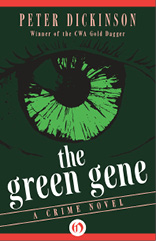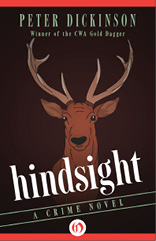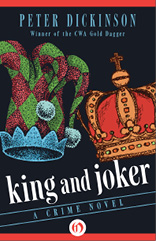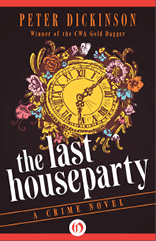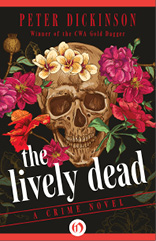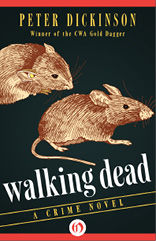The Last Houseparty (26 page)
Read The Last Houseparty Online
Authors: Peter Dickinson

Now he stood in the musty, dingy air of this other clock tower staring vaguely at the figures of the carousel. The second milkmaid faced him directly, seeming to answer his gaze. Even seen close to, even with her paintwork faded by more than fifty years, her look was one of immense if accidental appeal, perhaps because the painter had happened to give her features a slight asymmetry, making what in the other figures was no more than paint and plaster seem as vulnerable and human as a snapshot of a child.
Mr Mason's sigh of exhaustion converted itself into the familiar puff of air up his face. Rung by rung he climbed the short ladder, resting twice. At the top he gripped the gallery handrail while he waited for breath. Then he walked along the gallery to the further figure, which until last week had been the Saracen; he took its dangling head in his palm, lifted and turned it so that neck fitted to shoulder blades, and twisted till the catch clicked. The features, white and staring, had a look of complete insanity, as accidental as the beauty of the second milkmaidâmore so, if anything, since Mr Mason could have had little practice in repainting Saracens as crusaders and vice versa, so any expression was likely to be pure chance, art at its most aleatory. But crazed, despairing, the figure looked, in its Saracen armour overpainted with a crusader cross. The effect would probably not have been visible from below; all that the spectators would have seen was that a dark-skinned warrior had tactfully vanquished a paler one.
Mr Mason turned and pulled open the door through which the warriors came and went. Sunlight glistened on the fresh-greased chain and track. Down in the courtyard the visitors were moving away, the Emir talking to Miss Quintain, but the staff remained under the cloisters, now watching not the clock but the departing stranger upon whom their livelihoods might possibly depend. The adults stood all under one arch, but the child Jo-jo had wandered up into the next and stood alone in its frame of pale stone tracery, shadow behind her. In honour of the royal visitor she was wearing a frock, pale blue with a white lace collar, but she stood as if in jeans in a quite unselfconscious lounge, with one hand on her hip and her legs crossed at the ankles. Mr Mason stared. His breath came more heavily. His right hand, as if of its own volition, moved up and caressed forward along the line of his jaw, up to the point of the cheekbone, slantwise almost to the temple, down past the ear to the corner of the jaw and forward along that line again, round and round, precise on the same path, as if controlled by the type of cam and gearing that sent the figures of the dances through their unalterable routines.
A voice called. Jo-jo skipped out of sight. Mr Mason shook himself, swallowed, withdrew his hand and glanced briefly at the fingertips. His lips grimaced disgust. Moving with definite urgency in spite of his exhaustion, he climbed down the first ladder and on down the second into the weight room. A camp-bed stood against the outer wall, with a suitcase at its foot. From the case he took a box of tissues and a pocket mirror, from his tool-chest a tin of detergent cream. Sitting on the bed he studied his image in the mirror. His fingertips, filthy with dust and grease, had massaged on to his right cheek a long irregular blotch, like a birthmark, so precise in its outline that it might have been deliberately painted there. Mr Mason sighed angrily, dipped his fingers in the cream and smeared it generously over the mark. It took several tissues to wipe his cheek cleanâindeed, for some time after the mark had gone he continued almost unthinkingly to smear and wipe. On the wall to the right of him the fourteen-foot pendulum swung steadily to and fro, beating the double seconds away.
About the Author
P
eter Dickinson was born in Africa but raised and educated in England. From 1952 to 1969 he was on the editorial staff of
Punch
, and since then has earned his living writing fiction of various kinds for children and adults. His books have been published in several languages throughout the world.
The recipient of many awards, Dickinson has been shortlisted nine times for the prestigious Carnegie Medal for children's literature and was the first author to win it twice. The author of twenty-one crime and mystery novels for adults, Dickinson was also the first to win the Gold Dagger Award of the Crime Writers' Association for two books running:
Skin Deep
(1968) and
A Pride of Heroes
(1969).
A collection of Dickinson's poetry,
The Weir
, was published in 2007. His latest book,
In the Palace of the Khans
, was published in 2012 and was nominated for the Carnegie Medal.
Dickinson has served as chairman of the Society of Authors and is a fellow of the Royal Society of Literature. He was made an Officer of the Order of the British Empire in 2009 for services to literature.
All rights reserved, including without limitation the right to reproduce this book or any portion thereof in any form or by any means, whether electronic or mechanical, now known or hereinafter invented, without the express written permission of the publisher.
This is a work of fiction. Names, characters, places, events, and incidents either are the product of the author's imagination or are used fictitiously. Any resemblance to actual persons, living or dead, businesses, companies, events, or locales is entirely coincidental.
Copyright © 1982 by Peter Dickinson
Cover design by Mimi Bark
978-1-5040-0489-3
This edition published in 2015 by Open Road Integrated Media, Inc.
345 Hudson Street
New York, NY 10014


FRESH EBOOK DEALS, DELIVERED DAILY
BE THE FIRST TO KNOW ABOUT
FREE AND DISCOUNTED EBOOKS
NEW DEALS HATCH EVERY DAY
FROM OPEN ROAD MEDIA

